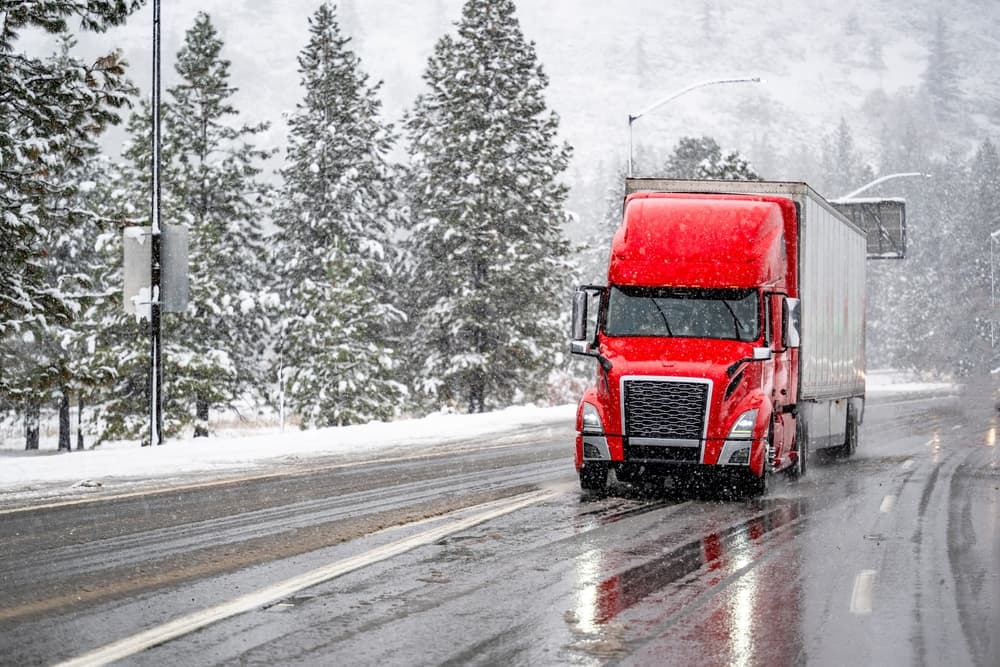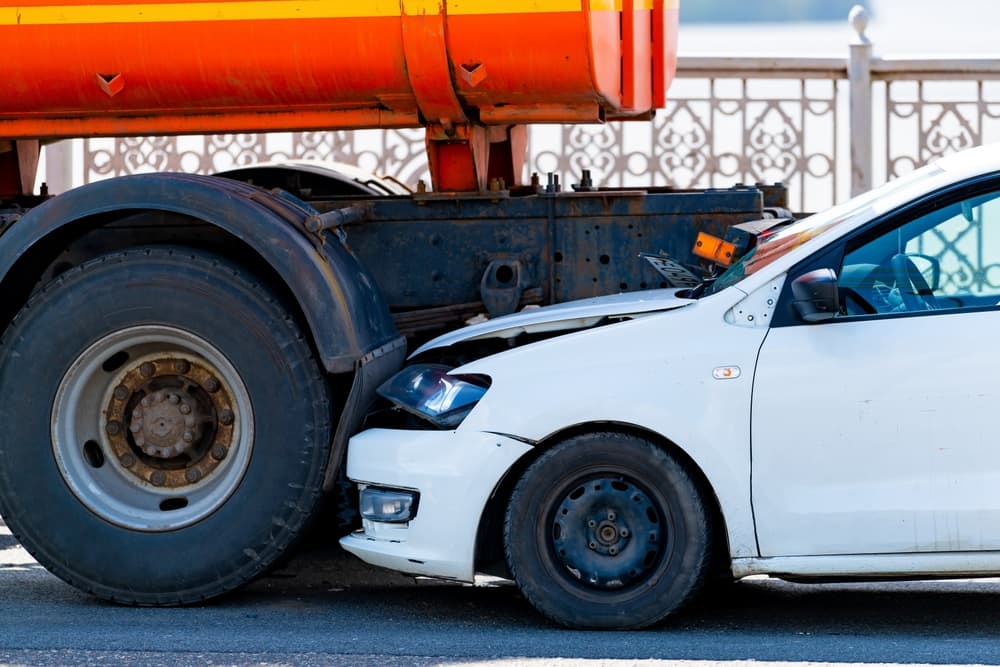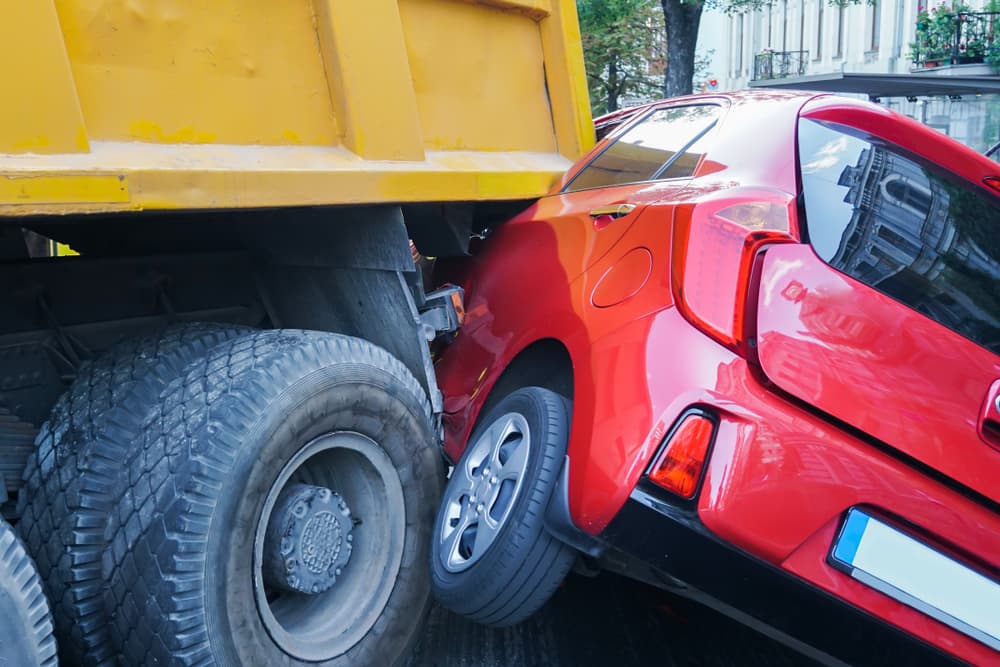Rear-end truck accidents are among the most common types of vehicular collisions, often resulting in severe injuries and significant property damage. The consequences of these accidents can be particularly devastating given the size and weight of trucks compared to passenger vehicles.
If you’ve suffered an injury in a rear-end trucking accident, consult a truck accident attorney as soon as possible. These cases can be challenging to navigate, but a skilled personal injury lawyer can take on your case, protect your rights, and pursue fair compensation on your behalf.
Causes of Rear-End Truck Accidents
Rear-end accidents involving large commercial trucks can happen for various reasons. Understanding the causes of these collisions is important for a compensation claim, especially when determining liability.
Driver Negligence
Driver negligence is one of the top causes of truck accidents. Some of the dangerous driving behaviors that most contribute to these collisions include:
- Distracted driving: Truck drivers may become distracted by mobile devices, navigation systems, eating, or grooming, leading to inattention on the road.
- Driving while fatigued: Long hours on the road without adequate rest can lead to drowsiness, impairing a driver’s reaction time and decision-making abilities.
- Speeding: Trucks require longer stopping distances than smaller vehicles. Speeding reduces the time a driver has to react to changes in traffic conditions.
- Driving under the influence: Many truck drivers face alcohol and substance issues, which can severely impair a driver’s ability to safely maneuver large commercial vehicles and put themselves and others at risk.
Drivers owe others on the road a duty to drive safely, especially considering commercial vehicles can cause plenty of injury and damage. When drivers engage in risky driving behaviors, they significantly increase the chances of collisions, including rear-end accidents.
Inclement Weather

Rain, snow, ice, and fog can reduce visibility and traction, increasing the risk of rear-end collisions. Truck drivers must adjust their speed and following distance during inclement weather, but failure can lead to severe accidents.
Improper Maintenance
Regular inspections and maintenance play a big role in the trucking industry. With the thousands of miles put on trucks, they must undergo routine maintenance to ensure everything is in working order. When there is a lack of maintenance and issues are not addressed, trucks are more likely to have problems while on long trips. Braking, steering, and tire issues are common without proper maintenance, making it harder for truck drivers to maneuver the vehicle and increasing the chances of accidents.
Overloading or Improperly Loaded Cargo
Commercial vehicles transport various items, from groceries to construction equipment and everything in between. When cargo is not loaded or secured properly, or a truck is overloaded and too heavy, truck drivers are more likely to encounter problems while driving. This can result in trouble with safely maneuvering the vehicle and braking.
Road Conditions
Potholes, debris, and poorly marked roads are just some of the common road conditions that lead to accidents. While these factors are not directly related to truck driver behavior, they can create hazardous conditions that contribute to rear-end collisions.
Tailgating
Due to the longer stopping time and distance required for large trucks, tailgating can substantially factor in rear-end collisions. When a truck driver follows too closely behind another vehicle, they may not have enough time to react to sudden stops or slowdowns.
Liability for Rear-End Trucking Collisions

Determining liability in a rear-end truck accident can be complex, often involving multiple parties. Some of the parties often found responsible in trucking collisions include:
The Truck Driver
If the truck driver was negligent—due to distracted driving, fatigue, or other negligent behavior—they may be held liable for the accident. Their actions directly contributed to the collision, making them primarily liable in a claim.
The Trucking Company
Employers can be held vicariously liable for their employee’s actions if they were acting within the scope of their employment at the time of the accident. They may also be liable if the trucking company fails to provide adequate training, enforce safety regulations, or maintain the vehicle properly.
Vehicle Manufacturers
The manufacturer may be held liable if a mechanical failure caused by a defect in the truck or its parts contributed to the accident. In addition to manufacturers, product designers and distributors may also be responsible.
Maintenance Providers
If the truck was under the care of a maintenance company, and their failure to maintain the vehicle contributed to the accident, they can be liable. Regular inspections and repairs are essential for safety; negligence in these areas can lead to fault.
Cargo Loaders
Cargo loaders must ensure cargo is adequately loaded onto the truck and secured and that the truck is not overloaded with too much cargo. When a truck’s cargo is improperly loaded or secured, or the cargo causes the truck to be overweight, cargo loaders can be held responsible.
Governmental Entities
In some cases, the government can share some responsibility for a truck accident. This is particularly the case when a hazardous road condition contributes to the collision. The city or governmental entity responsible for road repairs and maintenance can be held liable.
Cases involving the government are usually trickier to navigate. Therefore, it is critical to have legal representation.
Common Injuries from Rear-End Truck Accidents
The injuries resulting from rear-end truck accidents can be severe and life-altering. Common injuries often include:
- Whiplash: A frequent outcome of rear-end collisions, whiplash occurs when the head is suddenly jerked forward and backward, causing serious neck pain, stiffness, and headaches.
- Traumatic brain injuries: The impact from a truck collision can lead to a TBI, like concussions or hemorrhages, which can have long-term effects on cognitive functions and overall quality of life.
- Spinal cord injuries: Injuries to the spinal cord can have serious results, sometimes including partial or complete paralysis, affecting mobility and daily functioning.
- Broken bones: The force of a truck collision can lead to fractures in various parts of the body, requiring extensive medical treatment and rehabilitation.
- Internal injuries: Injuries to internal organs can be life-altering and may not be immediately apparent following an accident, making them especially dangerous.
Along with physical injuries, a truck accident can lead to emotional trauma. Victims of rear-end truck accidents may develop several issues, from anxiety to PTSD. This trauma can be taxing and affect day-to-day life.
What To Do Following a Rear-End Trucking Crash

If you are involved in a rear-end trucking collision, taking the right steps is important to ensuring your health and ability to pursue compensation. The following steps can help protect your rights and get the help you need to seek justice and financial recovery.
Seek Medical Attention
Getting medical attention after a truck accident is critical. You can receive aid at the collision scene if your injuries are severe. In addition, you should get a thorough physical examination in the hours or days following your accident.
Some injuries, like whiplash or internal injuries, may not manifest immediately. Still, these injuries deserve prompt attention to avoid complications. Receiving adequate medical care ensures you receive the right treatment and begin your journey to recovery quickly. Also, getting prompt attention establishes a medical record linking your injuries to your accident, which is vital for your compensation claim.
Notify Your Insurance Company
Notify your insurance company about the accident as soon as possible. Provide them with the necessary information, but avoid getting too into detail at this stage. Even if you were not at fault for the collision, you should still report your accident to your insurer to avoid any potential issues.
Consult with an Experienced Truck Accident Attorney
Engaging a knowledgeable personal injury attorney who is highly experienced in truck accidents is critical. A personal injury lawyer can help you understand your rights, gather evidence, and navigate the complex legal landscape surrounding trucking accidents. An attorney working on your case puts you in a much better position to get the desired results.
Follow Up on Medical Treatment
You should adhere to your treatment plan and attend all follow-up appointments throughout your case. Doing so not only aids your recovery but also demonstrates your commitment to addressing your injuries and healing.
Evidence Used in Rear-End Truck Accident Cases

In rear-end truck accident cases, various kinds of evidence can be vital for establishing liability and understanding the circumstances of the collision. Some of the most important types of evidence used in these cases include:
- Police reports: Official accident reports, including officer observations, can provide details about the incident.
- Witness statements: Eyewitness accounts can offer additional perspectives on how the accident occurred.
- Photographs and videos: Visual evidence of the accident scene, vehicle damage, and road conditions can help illustrate what happened.
- Dashcam footage: If available, video footage from the truck or nearby vehicles can provide a clear account of the events leading up to the collision.
- Event data recorders (EDRs): Trucks often have EDRs that capture data related to speed, braking, and other vehicle metrics at the time of the accident.
- Maintenance records: Records showing the truck’s maintenance history can be important, especially if mechanical failure is a factor.
- Driver logs: Logs detailing the driver’s hours of service and rest periods can help establish compliance with regulations and fatigue levels.
- Traffic cameras: Footage from nearby traffic cameras can provide an objective view of the accident.
- Accident reconstruction: Experts can analyze the evidence to recreate the accident and better determine and explain how it happened.
- Medical records: Injuries sustained by those involved can help establish the severity of the accident and the impact on victims’ lives.
Collecting and analyzing evidence is vital for determining liability and pursuing compensation for damages resulting from the accident.
Pursuing Compensation for a Truck Accident
When you suffered an injury in a rear-end truck accident, you may have the opportunity to pursue compensation for your expenses and losses. Your pursuit of financial recovery is unique to your situation, and a truck accident lawyer can guide you through the process to obtain the best possible settlement.
Victims of rear-end truck accidents may be entitled to several types of damages, depending on the case’s specifics. Damages are either economic or non-economic and may include:
- Medical expenses: Compensation for all medical costs incurred due to the accident, including hospital stays, surgeries, rehabilitation, and ongoing care.
- Lost earnings: Reimbursement for income lost due to the inability to work after the accident, including future earning potential if the injuries are long-lasting.
- Property damage: Compensation for repairs or replacement of damaged vehicles and personal property.
- Pain and suffering: Damages for physical pain and emotional distress experienced as a result of the collision and injuries.
- Disability: Damages for long-term or permanent changes in physical ability due to the accident.
Your attorney can assess your case and calculate your damages to better understand the total value of your claim. Knowing how much your case is worth is necessary to ensure you get the compensation you’re owed.
Time Limits for Filing a Claim Following a Rear-End Trucking Collision
If you’re interested in pursuing compensation after your rear-end truck accident, there is limited time to do so. Depending on your state’s statute of limitations law, you may only have one to six years to file a lawsuit. If too much time lapses and you don’t file your claim on time, you may miss your chance to secure a fair financial recovery.
Hiring a truck accident lawyer right away is vital. An attorney can begin working right away and ensure your case is handled timely and efficiently to avoid errors or setbacks.
After a Truck Accident, Do Not Wait to Seek Legal Representation

If you’ve been involved in a rear-end truck accident, you should always contact a truck accident attorney. Rear-end truck accidents can result in catastrophic injuries and complicated legal issues. If you’re harmed in a trucking collision, taking immediate and informed steps can positively impact the outcome of your case.
Seeking legal counsel is essential. A personal injury attorney can handle all aspects of your case, provide support and guidance, and protect your rights and best interests as they pursue the justice and compensation you deserve after your rear-end trucking collision.
